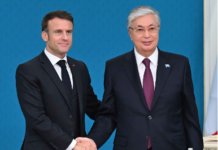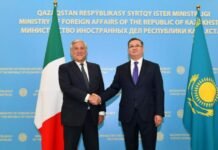
After Syrian President Bashar Assad was last month elected for his fourth seven-year term in office, claiming to have won 95.1% of the vote, several Western governments were quick to lambast the election as a sham and fraudulent. A joint statement from France, Italy, the US and Britain branded the electoral process “illegitimate”.
Making no public comment was the Czech Republic, the only EU nation to have kept open its embassy in Damascus since the beginning of the Syrian civil war, a decade-long conflict that has killed almost half a million people and driven 11 million from their homes.
Whereas other Western states shut their embassies in Damascus in 2012 — most sending their staff to Beirut in neighbouring Lebanon — Prague decided to maintain diplomatic relations, a decision that has benefited both pro-US and pro-Russian voices within the Czech Republic, and also appears to have sparked little controversy amongst the Czech public.
But the Czech Republic’s solitude in Syria may be coming to an end. As Damascus has now regained control of the majority of the country with the backing of Moscow and Tehran, it is trying to win back support in the international community.
Reports from Greek media assert that Cyprus’ foreign minister announced in May 2020 that it was reopening its embassy in Syria, and last week agreed to rent a new property in Damascus. Reached by Euronews, the Cypriot Ministry of Foreign Affairs declined to make any comment.
But a source told Euronews that Nicosia already had a permanent diplomatic presence in a hotel since autumn last year. The same source also said that Bulgaria currently had its embassy in Damascus open, but Euronews did not get a response when it requested comments from the Bulgarian foreign ministry.
Last week, Qatari newspaper Al-Watan reported that several other EU states, including Hungary and Greece, were also planning to re-engage diplomatically with Syria. Euronews cannot confirm these reports.
Will other EU nations join Prague in reopening their embassies in Damascus? If so, what would it mean for the EU’s policy against normalising relations with the Assad regime?
Euronews looks into the Czech case and its implications for the EU’s relations with Syria, as other European nations appear tempted to restore ties with Damascus.
What’s behind the Czech decision to stay in Syria?
Although good Czech-Syrian relations date back decades, the supposed driving force behind the decision was Eva Filipi, an experienced Czech diplomat in the Middle East who became ambassador to Syria in 2010.
“Filipi herself has good relations with the Syrian regime,” said Marek Cejka, a political scientist and expert on the Middle East at Mendel University in Brno.
“During the bloodshed of the civil war, she spoke apologetically in the regime’s defence, and the Czech embassy also issued visas to various exponents of the Syrian regime,” Cejka added.
On the other hand, Cejka said, it is an “indisputable fact” that Filipi is a very experienced diplomat in the Middle East – having previously served as ambassador to Turkey and Lebanon, and as chargé d’affaires in Iraq in the 1990s – and with ties in Syria that few other foreign diplomats possess.
This was clearly recognised by other powers because, in August 2012, the Czech Republic accepted a request by the United States to be its “protecting power” in Syria.
The idea of a “protecting power” in international diplomacy dates back centuries and the US has often used the embassies of other states to offer informal services for US citizens in a third country.
It is also believed that this arrangement allows Washington to engage in backchannel communications with a foreign government it formally denounces.
The Swiss embassy, for instance, served as the United States’ protecting power in Cuba between 1961 and 2015, when the US reopened diplomatic links with Havana.
The Czech embassy in Syria maintains one official, a Czech national, as head of its “US Interests Section.”
An article in Foreign Policy in 2017 noted that the former US ambassador to Syria, Robert Ford, approved of the Czech Republic becoming America’s “protecting power” for two reasons.
Firstly, because it was one of the few Western governments willing to keep its embassy open in Syria. Several European governments on the list of potential protection powers said that they would close their embassies if the US did, Ford told Foreign Policy.
But ambassador Filipi, whom Ford knew well from their time as diplomats in the region, said “hers would stay open”.
Czech politicians from across the spectrum were in support of Filipi and the embassy decision, said Cejka, including the pro-European Karel Schwarzenberg, who served as foreign minister between 2010 and 2013 when the decision was made.
According to Ford, the second reason was that “we have a very good relationship with the Czech Republic,” an indication that Washington trusted in Czech diplomacy.
According to the website of the Czech embassy in Syria, at least eight officials are currently based in Damascus, including economic and political attache, as well as a Military and Air Attache and Adjutant Defence Attache.
What has Prague gained from its presence in Syria?
The Czech embassy has engaged in humanitarian projects in Syria since 2016 and last month approved three new land-development programmes, with the Czech government contributing around €20,000 to each.
The National Museum in Prague was granted a unique licence to carry out archaeological research in Syria in 2019.
In 2017, the embassy also played a major role in securing the release of a Polish national who had been jailed by the Damascus regime for unspecified charges. The following year, it did the same for two workers – one a German national – for a German humanitarian group who had also been imprisoned in Syria.
When the then-speaker of the US House of Representatives Paul Ryan visited Prague in 2018, he thanked the government for its assistance in Syria. So, too, did US Secretary of State Mike Pompeo when the then-Czech foreign minister, Tomas Petricek, visited Washington the following year.
“It’s not something that has completely changed Czech-US relations, but it is an issue that the US is keen on stressing,” said Jan Daniel, coordinator of the Middle East and Africa Politics Unit at the Institute of International Relations in Prague.
The Czech embassy in Syria and ambassador Filipi failed to respond to requests for comments.
On the other hand, there are suggestions that keeping open its embassy in Syria played into the hands of President Milos Zeman, who has tried to nudge Czech foreign policy closer towards Russia and China since his election in 2013.
“It will certainly be true to some extent that current Syrian-Czech relations are an extended hand of Zeman’s pro-Russian policy,” said Cejka, of Mendel University.
After the fall of communism in 1989, the Czech establishment pursued a Westwards-looking foreign agenda with close relations to the US and Western European states.
But Zeman has argued that foreign policy needs to be more pragmatic and focused on extracting economic benefits from Moscow and Beijing. Several of Zeman’s associates have close connections to Russian and Chinese firms that have invested in the country.
According to a Kremlin readout of a meeting between Zeman and Russian President Vladimir Putin in November 2017, Zeman told his counterpart: “You have won in Syria.” He went on to describe Assad as the “democratically elected president”.
In 2016 and again in 2018, Zeman publicly criticised the American stance on the Syrian civil war, expressly denouncing joint American, French and British airstrikes on Syria that year.
In 2019, he accused Turkey – which has opposed the Assad regime and supports Free Syrian Army forces – of allying with the Islamic State group and committing war crimes in Syria.
Zeman also has been a key supporter of ambassador Filipi, said Daniel. He has granted Filipi, now 77 years old, an exemption as Czech civil service law requires diplomats to retire at 70. She has also been an ambassador for more than a decade, whereas Czech diplomats are typically rotated every four years.
According to Cejka, the Czech Republic’s policy on Syria may also be influenced by President Zeman’s critique of Islam, given that Assad’s regime is largely made up of members of Syria’s non-Muslim minorities and is viewed by some as a bulwark against Islamism in the Middle East.
Zeman, known for his anti-Islam comments, commented in his Christmas message during the height of the migrant crisis in Europe in 2015: “I am profoundly convinced that we are facing an organised invasion and not a spontaneous movement of refugees.”
Yet the issue of the Czech Republic’s relations with Assad’s regime has not become a major part of public discourse domestically, sources said.
Opposition politicians and newspaper columnists have occasionally critiqued the Czech presence in Syria, asserting that it not only legitimises the Assad regime but also publicly defends Russian interests in the Middle East.
This was felt most strongly amongst Czech commentators in 2015 when Russia intervened militarily in the conflict. In April 2017, then-Foreign Minister Lubomir Zaoralek warned that the embassy might close if it was proven that Assad’s forces had used chemical weapons against civilians.
Further controversy was stirred domestically in 2019 when local media reported on the Czech embassy giving visas to Syrians who had close relations to those on international sanction lists. That included Jawad Rida, the son of Assad-advisor Buthajna Shabaan, who is on the EU’s sanctions list.
The 2017 annual report from the Czech intelligence service (BIS) noted that the country had become a route to Europe’s Schengen Area “for some high-ranking representatives of the Assad regime or their descendants”.
But public interest in foreign policy is low in the Czech Republic and even the intense current debates over relations with China and Russia are proxy issues for domestic politics, said Daniel.
In recent years, liberal politicians, mainly from opposition parties, have sought to burnish their democratic credentials by opposing closer relations with Moscow and Beijing.
It also fits a historic narrative of a communist giant from the East threatening a small independent nation, which locally draws analogies to the 1968 Prague Spring when Soviet troops put down attempts by local communist leaders to liberalise their socialist system.
“There’s not such an easy narrative with Syria as there is with China and Russia,” said Daniel.
Indeed, while many liberals in the Czech Republic would probably support a democratic uprising in Syria, he noted, the issue over who opposes Assad’s regime, from democrats to Islamists, complicates the matter.
Instead, the discourse over Czech relations with Syria is mostly conducted amongst politicians and academics specialising in the Middle East, Daniel added.
Now it has been almost a decade since most European states closed their embassy doors in Damascus, leaving the Czech Republic the outlier, it remains unclear whether it was worth the decision.
What has been the EU policy in Syria so far?
The EU has adopted sanctions against the Assad regime ever since the decade-old conflict began in 2011. The sanctions, which have escalated as the war unfolded, include travel bans and asset freezes against Assad and other top political officials, military officers and business people.
Currently, 283 people and 70 entities in Syria are on the EU’s sanctions list.
Brussels has been adamant that any form of normalisation with the Assad regime was out of the question.
In a statement released after the May 26 election, EU High Representative Josep Borrell said it “met none of the criteria of a genuinely democratic vote” and “cannot lead to any measure of international normalisation with the Syrian regime”.
The European Parliament reiterated a similar position in a recent resolution adopted in March. “As long as there is no fundamental progress on the ground with clear, sustained and credible engagement in an inclusive political process, MEPs oppose any normalisation of diplomatic relations with the Syrian regime,” the text read.
Despite its firm stance against the Syrian regime, the EU still maintains lower-level diplomatic contacts with Syria.
The EU Delegation to Syria continues to operate from Beirut, while carrying out regular missions to Damascus, according to its website. It still has premises in Damascus with local staff only, a source told Euronews.
Julien Barnes-Dacey, director of the Middle East & North Africa programme at the European Council on Foreign Relations, told Euronews that maintaining such a diplomatic presence in Syria did not contradict the EU’s policy not to normalise relations with the regime.
“The contacts are fairly low level and distant and we would fall into a trap of our own making if we equated that to diplomatic recognition,” the expert told Euronews.
He noted that these lower-level contacts “served a valuable purpose,” including understanding the situation on the ground and operationalising the bloc’s humanitarian support in Syria. The EU is the largest international donor to the war-torn country, with over €24 billion mobilised to help those affected by the armed conflict.
MEP Barry Andrews, who has worked extensively on EU-Syria relations, agreed on the need for the EU to maintain channels of communications with Damascus.
“I think there has to be a line of communication. I have consistently called for the appointment, by the external action service, of an EU special envoy to the Syrian conflict. We need to have an opportunity for a dialogue of some sort, and channels of communications. And I think a special envoy would underline how seriously we take this issue,” the EU lawmaker from Ireland told Euronews.
Is a policy change in sight for EU-Syria relations?
Reports of European countries preparing to reopen their embassies in Damascus come amid fears of a normalisation of the Assad regime in the international arena.
Last week, a decision to grant the Assad’s government a seat on the executive board of the World Health Organization sparked criticism and protests in rebel-held areas.
Yet multiple sources told Euronews that the EU was nowhere near normalising its relations with the Assad regime, even if the reports on Greece, Cyprus, Hungary and others reopening embassies turned out to be true.
“I don’t think the position has changed whatsoever at EU level. I would not entirely dismiss these reports, but I would put them in the context of other issues, not related to Syria directly but more related to anxieties about Turkish foreign policy, in the case of both Greece and Cyprus,” said Andrews.
“So those reports are really more about regional issues and in the case of Hungary, a way to undermine the European ideal in a way that has been a feature of Hungarian policy over the last couple of years,” the Renew Europe MEP told Euronews.
Barnes-Dacey noted that “none of the key EU member states” had moved in the direction of normalising diplomatic relations and that the bloc had just renewed its sanctions on Syria two weeks ago. “So I don’t necessarily read this as too profound of a shift,” he said, while warning that the reports on the reopenings should be taken with caution.
“That being said, I think there is some sense in European capitals that the harder armed conflict element of the civil war is ending and there is an interest in some lower-level contact on the ground to advance narrow interests,” the expert added.
A source told Euronews that rumours on the reopening of Cypriot, Greek and Hungarian embassies were nothing new and had been recently revived by Assad propaganda to underline its alleged recognition and normalisation.
“The regime wants to project an image of European re-engagement,” Barnes-Dacey confirmed, “so this could very well be a message driven by Damascus.”





